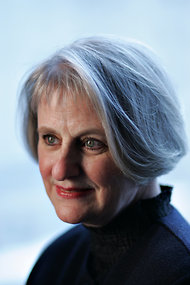Orin Snyder, a lawyer at Gibson, Dunn Crutcher who represents Apple, made that point in a Manhattan courtroom on Thursday, the last day of the three-week antitrust trial. He told Judge Denise L. Cote of United States District Court that if Apple was found liable for conspiring with publishers to raise e-book prices, “that precedent will send shudders through the business community.”
In the future, he said, retailers negotiating with content providers might then feel pressured to “not utter a word” about their discussions with other companies and offer substantially different terms to each party.
He said that in negotiations, businesses typically inform one competitor what another competitor is willing to do. “It is perfectly lawful to do all of that,” he said.
In its antitrust case brought a year ago, the federal government accused Apple of being the “ringmaster” in a conspiracy with five big book publishers to raise e-book prices across the industry. Before Apple entered the market in early 2010, Amazon controlled 90 percent of e-book sales, and the publishers were not happy with Amazon’s uniform price of $9.99 for e-books. The publishers have all settled their cases, but Apple has said it is fighting as a matter of principle because it has done nothing wrong.
Much of the debate at the trial has centered on a condition, known as the “most-favored-nation” clause, that Apple made in its contracts with publishers. It guarantees that if a publisher offers an e-book at a lower price to one retailer, the book will cost the same in Apple’s e-book store. The Justice Department argues that Apple and the publishers used the most-favored-nation clause to defeat price competition and pressure Amazon to change the way it sold books and raise its prices as well.
On Thursday, as the lawyers wrapped up their arguments, Judge Cote peppered both Apple and the government with questions.
Several of her questions to the government revolved around one thought: why would Apple want to change the industry’s business model? Mark W. Ryan, a lawyer for the Justice Department, argued that Apple believed its iPad hardware was so ahead of anyone else’s, it wanted to eliminate price competition in the e-book market so that the iPad could compete with the Amazon’s Kindle solely on hardware, not book prices.
Mr. Ryan noted that the government’s concern was not solely the most-favored-nation clause, but the way that Apple and the publishers deliberately used the clause to force Amazon’s hand. “It’s the collusion to move the market to the place where competition would not otherwise take it,” he said.
If Amazon had continued the way it sold books under what is called the wholesale model — where publishers charged retailers about half the cover price for a book and Amazon sold the books for $9.99 — then the retailers would have lost a substantial amount of money selling the books for $9.99 to Apple because Apple takes a 30 percent cut.
That, Mr. Ryan said, is why the publishers understood they had to collectively force Amazon into the agency model, where the publishers, not the retailers, set the price of the books. They could use the most-favored-nation clause to put pressure on Amazon while also threatening to delay the release of their e-books until after the more expensive hardcover versions had been on the market for a while, he said.
Judge Cote challenged the government’s interpretation that Apple was deliberately scheming to help the publishers raise prices. Allowing them to raise their prices in Apple’s e-book store could be viewed as a “sales pitch” to get the publishers to agree to sign on with Apple in the month and a half leading up to the iPad introduction, she said.
In Apple’s closing statements, Mr. Snyder spent most of his time trying to illustrate that Apple fought “tooth and nail” with the publishers before cementing the contracts. He showed e-mails between Eddy Cue, Apple’s senior vice president of Internet software and services, and the chief executives of the big publishers that demonstrated they were negotiating rather than cooperating.
Judge Cote asked Mr. Snyder whether Apple took the position that it had not understood that the publishers were forming a collective effort to raise prices industrywide, when the fact they were working together seemed obvious from articles published by The New York Times and The Wall Street Journal. Those articles said a group of publishers had announced plans to “window,” or delay, the release of e-books.
Mr. Snyder said that the articles just showed how business was done, and that they did not prove that the publishers were already conspiring. “When one company does one thing, the other companies take notice and do the same thing,” he said.
The big question surrounding the trial is whether there will be a change to the way businesses negotiate if Apple loses, as Mr. Snyder suggested. Charles E. Elder, an antitrust lawyer at Irell Manella, which is not involved in the case, said that most-favored-nation clauses present unusual challenges under antitrust laws. While they ensure a customer gets the best deal, they can discourage price-cutting because the consequence of lowering prices for one retailer will be lowering prices for other retailers protected by the clause.
Mr. Elder said that he “would be very surprised” if the judge found Apple’s most-favored-nation clause illegal, and that he was not aware of any case where such a thing has happened. He said this antitrust case was based on the theory that the most-favored-nation clause resulted from a price-fixing conspiracy among the publishers that was furthered by Apple. If the judge holds Apple liable, he said, this case will be unlikely to have a “revolutionary impact” on businesses.
“Horizontal conspiracies to fix prices have always been illegal,” Mr. Elder said.
Judge Cote is expected to write her decision in the coming weeks.

Article source: http://www.nytimes.com/2013/06/21/business/outcome-of-e-book-case-could-hurt-competition-apple-lawyer-says.html?partner=rss&emc=rss
